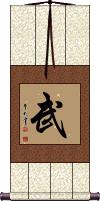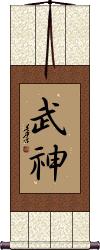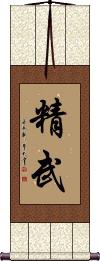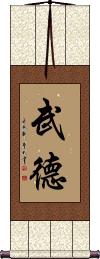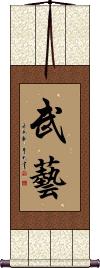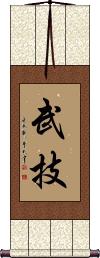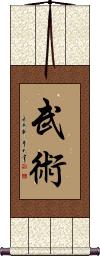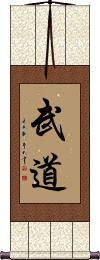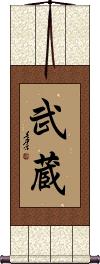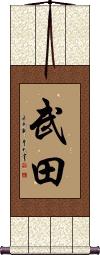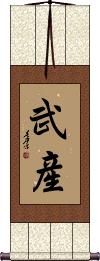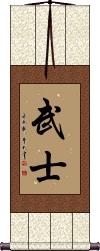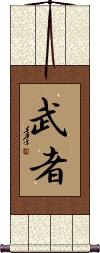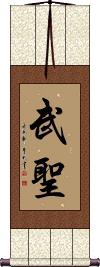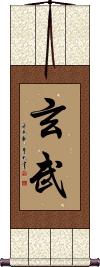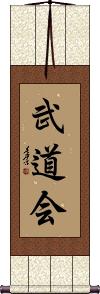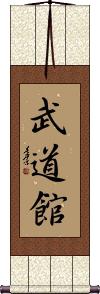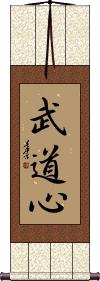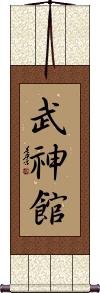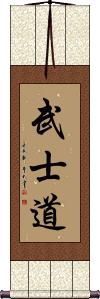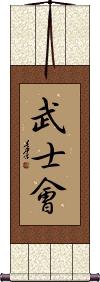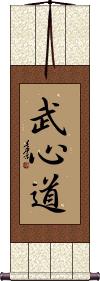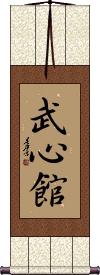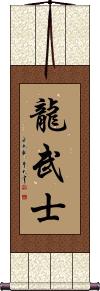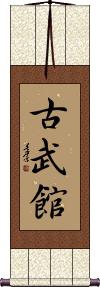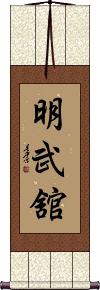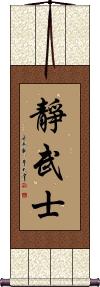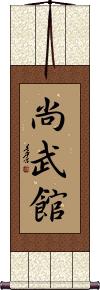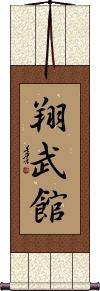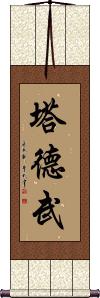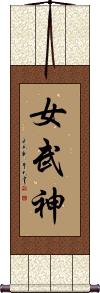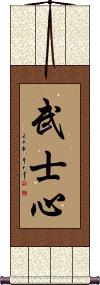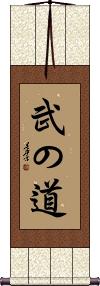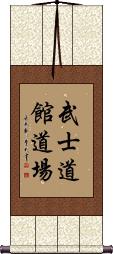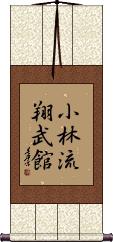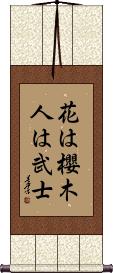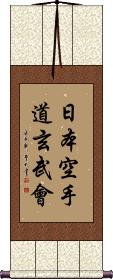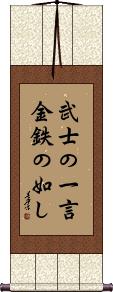Many custom options...
And formats...

武 in Chinese / Japanese...
Buy an 武 calligraphy wall scroll here!
Personalize your custom “武” project by clicking the button next to your favorite “武” title below...
1. Warrior Essence / Warrior Spirit / Martial
4. Martial Morality / Martial Arts Ethics / Virtue
5. Martial Arts
9. Musashi
10. Takeda
11. Takemusu
12. Warrior
13. Warrior / Musha
14. Warrior Saint / Saint of War
15. Xuan Wu / Genbu / Black Tortoise God
16. Budoka
17. Budo-Kai
18. Budokan
19. Budoshin
20. Bujinkan
21. Bushido / The Way of the Samurai
22. Bushi Kai
23. Bushindo
24. Bushinkan
25. Daredevil Warrior / Soul of a Warrior
26. Dragon Warrior
27. Kanbukan
28. Kobudo
29. Kobukan
31. Meibukan
32. Quiet Warrior
33. Shadow Warrior
34. Shobukan
35. Tadeu
36. Valkyrie
37. Heart of a Warrior / Samurai Heart
38. Warrior’s Path
39. Wudang Fist
40. Aiki Budo
41. Budo Kai Jutsu
42. Bushidokan
44. Koryu Bujutsu
45. The Nature of Martial Arts
46. Quiet Warrior
47. Seishin Budo
49. Takemusu Aiki
50. Tiburcio
52. Warrior Within
55. Ryukyu Kobujutsu
56. Okinawan Kobudo
57. Peaceful Warrior
58. Seishin Budokan
59. Silent Warrior
60. Spirit Of The Dragon Martial Arts
61. Bushidokan Dojo
63. In Flowers the Cherry Blossom, In Men the Samurai
Warrior Essence / Warrior Spirit / Martial
武 is the essence or spirit of a warrior. 武 is part of the word “wu shu” which is sometimes translated as “martial arts” or “kung fu.”
In more modern speech and another context, this can mean military, martial, warlike, fierce, and perhaps violent but usually as a prefix for a longer word or phrase.
Bushin / Bujin
God of Military Arts
武神 is the title for Bushin, or “God of Military Arts.”
This can also be translated as “Martial Spirit.”
This title is often associated with Bujinkan, a school/style of martial arts. In that context, this can be pronounced Bujin.
In some cases, pronounced/romanized as Bukami, especially when used as a surname in Japan.
Jing Mo / Jing Wu
精武 is the title used for a certain type of martial arts. You can translate this roughly as “Excellent Martial Arts” or “Excellence in Martial Arts.” You will notice that the second character is “wu” as in wushu (martial arts) and wushi (warrior).
More information can be found at the Jing Mo website. You should probably only order this if you are a member of this association.
Note that “jing mo” is the Cantonese pronunciation of these characters. In Mandarin, they are “jing wu.”
Also used in Korean but only by those involved with martial arts who can also read Korean Hanja (a small percentage of the population).
Martial Morality / Martial Arts Ethics / Virtue
This refers to the virtue, morality, and ethics that any practitioner of martial arts should possess.
This can be used in both Chinese and Japanese in place of English terms such as “soldierly virtue,” “good conduct” (military), “warrior ethics,” and being honorable regarding any fight or competition.
In Japanese, there is a slight variation in the last character, making it 武徳 instead of 武德 in Japan. And yes, just one little horizontal stroke is omitted. If you need the Japanese version, please choose a Japanese calligrapher, or drop me a note so that I make sure you get the characters you intend.
Martial Arts
武藝 is a Korean Hanja title that means “martial arts” or “military skill.”
武藝 is also a word in Chinese but used more often in the context of Korean martial arts.
From Korean, this is romanized as either “mu ye” or “moo ye.”
If you want to order this in modern Korean Hangul, just click the Hangul characters in the pronunciation box next to the Korean flag above.
Martial Arts Skills
武技 can be translated as “martial arts skills,” “warrior skills,” or “military skills,” depending on usage.
In both Japanese and Chinese, rather than meaning martial arts, this speaks more to the skills that you possess in regard to martial arts. This phrase also has a light suggestion of “having the itch to show off these skills.”
Martial Arts / Wushu
武術 is Wushu or Wu Shu, the very Chinese way to express “Martial Arts.”
Some even use this word to describe Kung Fu directly. But this is a label that fits all disciplines from Karate to Kung Fu to Taekwondo.
Note: This also means Martial Arts with the same appearance as old Korean Hanja characters and is pronounced “musul” or “musur” in Korean.
While this is best if your audience is Chinese or Korean, this also means “martial arts” in Japanese, where the popularity of this term is growing (romanized as Bujutsu or Bujitsu) in Japanese martial arts circles.
Martial Arts / Budo
Way of the Warrior
武道 is the very common Japanese way to say “Martial Arts.”
武道 is used mostly in Japanese dojos but is also understood in Chinese and Korean.
Some will use this title to mean chivalry (the conduct of a knight) or military art. The way this word is understood would depend on the context in which it is used.
The first character means “force,” “warlike,” or “essence of a warrior.”
The second character means “method,” “path,” and “the way.” It is the same character used to describe/mean the philosophy of Taoism / Daoism.
Some will also translate this as “The Way of the Warrior”; especially in the context of Korean martial arts.
Musashi
The most famous Samurai
Miyamoto Musashi is probably the most famous Samurai in all of Japanese history.
武蔵 is the short title for a man long in legend. While coming from a lower class, his new sword and fighting techniques put him on par with the best that feudal Japan had to offer. His long career started with his first duel at age 13!
He is credited with using two swords at once and never losing a single battle in his career. After becoming a Buddhist, and getting older, like many old warriors, he took up a peaceful and solitary life until his death around 1645 A.D.
Note: Technically, Musashi is his given name, and Miyamoto is his surname. However, it's suggested that he assumed both of these names and had a few other names in childhood, as well as being given a Buddhist name. It's hard to know what to call him, as with most Kanji, there are multiple pronunciations. The characters for Musashi can also be pronounced Takezō. But everyone in modern times seems to know him by the name Musashi.
Takeda
Surname
Takemusu
Warrior
The first character, 武, is the spirit or essence of a warrior. The second character, 士, means soldier, officer, or official. 武士 is also used appropriately enough to describe a piece of a chess game. 武士 can also be translated as a soldier, cavalier, palace guard, or samurai, and sometimes as a knight. I've occasionally seen this translated as strong man or tough man (gender not necessarily implied).
By far, 武士 is the most common way to write warrior in Chinese characters, Japanese Kanji, and old Korean Hanja.
Note: In Japanese, this is Bushi, as in Bushido.
Warrior / Musha
Warrior Saint / Saint of War
Xuan Wu / Genbu / Black Tortoise God
玄武 can refer to the Black Tortoise (an ancient Chinese constellation of stars- part of the seven mansions of the north sky).
In Daoism, this is the God of the North sky.
This also refers to a Black Tortoise god, said to rule over the northern heavens in Japanese. Can also be pronounced/romanized as genmu or when used as a personal name, Hirotake in Japanese.
Budoka
Martial Artist
Budo-Kai
Budokan
Budoshin
Bujinkan
Bushido / The Way of the Samurai
武士道 is the title for “The Code of the Samurai.”
Sometimes called “The Seven Virtues of the Samurai,” “The Bushido Code,” or “The Samurai Code of Chivalry.”
This would be read in Chinese characters, Japanese Kanji, and old Korean Hanja as “The Way of the Warrior,” “The Warrior's Way,” or “The Warrior's Code.”
It's a set of virtues that the Samurai of Japan and ancient warriors of China and Korea had to live and die by. However, while known throughout Asia, this title is mostly used in Japan and thought of as being of Japanese origin.
The seven commonly-accepted tenets or virtues of Bushido are Rectitude 義, Courage 勇, Benevolence 仁, Respect 礼(禮), Honour 名誉, Honesty 誠, and Loyalty 忠実. These tenets were part of oral history for generations, thus, you will see variations in the list of Bushido tenets depending on who you talk to.
Bushi Kai
Bushindo
Bushinkan
Daredevil Warrior / Soul of a Warrior
鬼武者 is an unusual title that can be translated two ways, daredevil warrior or demon warrior.
The most common is probably the daredevil warrior. However, the first character means demon, ghost, or soul of the departed. Therefore, it can mean the soul of a warrior or a demon warrior.
This title is Japanese only, and should not be used if your audience is Chinese.
Dragon Warrior
Kanbukan
韓武館 roughly translates as “Hall of Korean Martial Arts” or “Korean Martial Hall.”
Kanbukan is one of the earliest Karate organizations established after WWII in Japan.
Note: Chinese and Korean pronunciations are included above; however, this title is only common in Japan.
Kobudo
古武道 is the title for Kubudo, which can be defined as Okinawan weapons fighting.
The literal translation would be something like “Old Martial Way.” The last two characters are often translated as “martial arts” so “Old Martial Arts” is another possible translation.
Please note that even though these are Chinese characters and can be pronounced in Chinese, this is a Japanese-only title. It is not often used nor understood in Chinese. So please consider this to only be appropriate for a Japanese audience.
Kobukan
Martial Arts Master
武芸者 is the Japanese Kanji title for “Martial Arts Master.” It suggests that you have reached at least the level of black belt and are probably to the level where you are ready to become an instructor.
Please consider carefully where you stand before ordering this phrase on a wall scroll. If you are not a master, this will make you look a bit foolish.
If you want to get this as a gift for your master at the dojo. Try to discreetly make sure this term is used in your school. Different schools and styles of Japanese martial arts use different terms. You may notice in the Romaji that the last two characters romanize as “geisha” which means “person skilled in arts” (what a geisha girl really is). The title here has the character for “martial,” “warrior,” and/or “military” in front of it. Therefore the literal translation is “martial art person.”
These Kanji are valid Chinese characters and Korean Hanja, but this title does not really make sense in Chinese and is not often used in Korean, though a Chinese or Korean would be able to guess the meaning by looking at the first and last characters.
Meibukan
Quiet Warrior
Shadow Warrior
影武者 is the title for Shadow Warrior in Chinese and Japanese.
This may refer to a few video games that share this English title, or a Japanese movie called Kagemusha.
If you are looking for the Japanese TV show, that was originally 影の軍団 (Kage no Gundan), which more literally means “Army of Shadows,” but was re-titled Shadow Warrior when released outside Japan in English.
In Japan, this title can also refer to a body double or decoy of an army general or leader used to avoid assassination. It can also be somebody who does all the work (or fighting) behind the scenes (not getting much, if any, credit).

Shobukan
Shobukan
Tadeu
Valkyrie
Heart of a Warrior / Samurai Heart
Warrior’s Path
Wudang Fist
Aiki Budo
合気武道 is the title Aiki-Budo or “Aiki Martial Arts” in Japanese Kanji.
合 means “union” or “harmony.”
気/氣 means “universal energy” or “spirit.”
武 means “martial” or “military.”
道 means “way” or “method.”
合気武道 is the modern Japanese way to write this. You may also see 合氣武道, where the second character is written in the older traditional (pre-1945) form. If you want this written 合氣武道, just include a note or email with your order.
合氣武道 are all Chinese characters as well, so I included the Chinese pronunciation above. However, while it can be understood in Chinese, this is not a common term in that language and is not used in any Chinese martial arts. Also, 気 is only used in Japan - Chinese will understand 気 to be the Japanese form of 氣.
Budo Kai Jutsu
Bushidokan
Enlightened Warrior
覺醒武士 is not a commonly used title in Chinese but is sometimes used in Martial arts and military contexts to refer to a warrior who seems always to be fully aware, enlightened, knowledgeable, noble, and just.
The first two characters are a word that means: to awaken; to come to realize; awakened to the truth; the truth dawns upon one; scales fall from the eyes; to become aware.
The last two characters mean warrior but can also refer to a samurai, soldier, or fighter.
Koryu Bujutsu
The Nature of Martial Arts
Quiet Warrior
Seishin Budo
精神武道 is the Japanese martial arts title, Seishin Budo.
The first two characters, 精神, can mean vigor, vitality, drive, spiritual, mind, spirit, soul, heart, ethos, attitude, mentality, will, intention, essence, and fundamental significance.
The last two characters, 武道, are the Japanese word for martial arts (literally the Martial Way).
This title can also be romanized as Seshin Budou or Seishin Budō.
Shaolin Martial Arts
Takemusu Aiki
武産合氣 is one of the core spiritual concepts developed by Morihei Ueshiba to support his practice of Aikido.
Breaking down the characters:
武 - Bu (as in Bushido) is read as “Take” here. It means martial.
産 - Musu means innocent or naive, but also refers to the idea of birth and creation.
合氣 - Aiki as in Aikido - unifying spirit.
Tiburcio
Warrior for Peace
Warrior Within
Bujinkan Ninjitsu
Bushi-Ryu Jujutsu
Ryukyu Kobujutsu
Okinawan Kobudo
Okinawan Kobudo
Peaceful Warrior
Peaceful Warrior
平和の武士 can be read as “Peaceful Warrior” or “Warrior for Peace” in Japanese. This sounds like an oxymoron in Japanese, so it's a weird title. Expect Japanese people to be perplexed when they see it.
Character breakdown:
平和 (heiwa) peace; harmony.
の (no) possessive particle.
武士 (bushi) warrior; samurai; soldier.
Seishin Budokan
Silent Warrior
Spirit Of The Dragon Martial Arts
Bushidokan Dojo
Shorin-Ryu Shobukan
In Flowers the Cherry Blossom, In Men the Samurai
This Japanese proverb simply reads, “[In] Flowers it's Cherry Blossoms, [In] Men it's Warriors.”
花は櫻木人は武士 is meant to say that of all the flowers in the world, the cherry blossom is the best. And of all men in the world, the Samurai or Warrior is the best
This proverb has been around for a long time. It's believed to have been composed sometime before the Edo Period in Japan (which started in 1603).
Some will drop one syllable and pronounce this, “hana wa sakura hito wa bushi.” That's “sakura” instead of “sakuragi,” which is like saying “cherry blossom” instead of “cherry tree.”
The third character was traditionally written as 櫻. But in modern Japan, that became 桜. You may still see 櫻 used from time to time on older pieces of calligraphy. We can do either one, so just make a special request if you want 櫻.
Note: Because this selection contains some special Japanese Hiragana characters, it should be written by a Japanese calligrapher.
Nippon Karate-Do Genbu-Kai
Japanese Genbu Karate Club
日本空手道玄武會 is the title for Nippon Karate-Do Genbu-Kai.
A Japanese karate association of the Genbu school.
Note that while this title does make perfect sense in Chinese, it is really a Japanese title. In fact, the first word is “Japanese/Japan.”
If you’d like your martial arts school, dojo or club added to our calligraphy database for easy ordering of a custom calligraphy wall scroll, just contact me.
The Warrior’s Word, Dependable as Gold and Steel
武士の一言金鉄の如し is an old Japanese proverb about the value of the word of a warrior.
Here are a couple of versions of how this can be translated:
A warrior's single word is as unchanging and reliable as gold and steel.
A warrior's promise is as dependable as gold, and his [scabbard contains] untarnished steel (a sword).
Note: Sometimes this phrase is written as 男子の一言、金鉄の如し (danshi no ichigon kintetsu no gotoshi)
Note: Because this selection contains some special Japanese Hiragana characters, it should be written by a Japanese calligrapher.
Not the results for 武 that you were looking for?
Below are some entries from our dictionary that may match your 武 search...
| Characters If shown, 2nd row is Simp. Chinese |
Pronunciation Romanization |
Simple Dictionary Definition |
武 see styles |
wǔ wu3 wu bu ぶ |
More info & calligraphy: Warrior Essence / Warrior Spirit / Martial(1) (archaism) the art of war; martial arts; military arts; (2) military force; the sword; (3) valor; bravery; (4) military officer; military man; (surname) Tokubu martial |
武士 see styles |
wǔ shì wu3 shi4 wu shih mononofu もののふ |
More info & calligraphy: Warrior(poetic term) warrior; soldier; samurai; (place-name) Mononofu |
武技 see styles |
bugi ぶぎ |
More info & calligraphy: Martial Arts Skills |
武田 see styles |
wǔ tián wu3 tian2 wu t`ien wu tien muta むた |
More info & calligraphy: Takeda(surname) Muta |
武神 see styles |
bushin ぶしん |
More info & calligraphy: Bushin / Bujin |
武者 see styles |
musha むしゃ |
More info & calligraphy: Warrior / Musha |
武聖 武圣 see styles |
wǔ shèng wu3 sheng4 wu sheng |
More info & calligraphy: Warrior Saint / Saint of War |
武蔵 see styles |
musashi むさし |
More info & calligraphy: Musashi |
武藝 武艺 see styles |
wǔ yì wu3 yi4 wu i |
More info & calligraphy: Martial Arts |
武術 武术 see styles |
wǔ shù wu3 shu4 wu shu bujutsu ぶじゅつ |
More info & calligraphy: Martial Arts / Wushu(1) martial arts; military arts; (2) (See 武術太極拳) wushu (Chinese martial art) |
武道 see styles |
budou / budo ぶどう |
More info & calligraphy: Martial Arts / Budo |
玄武 see styles |
xuán wǔ xuan2 wu3 hsüan wu genbu; genmu げんぶ; げんむ |
More info & calligraphy: Xuan Wu / Genbu / Black Tortoise God(1) (See 四神) Black Tortoise (god said to rule over the northern heavens); (2) {astron} (See 二十八宿) seven mansions (Chinese constellations) of the northern heavens; (personal name) Hirotake |
古武道 see styles |
kobudou / kobudo こぶどう |
More info & calligraphy: Kobudo |
女武神 see styles |
nǚ wǔ shén nu:3 wu3 shen2 nü wu shen |
More info & calligraphy: Valkyrie |
影武者 see styles |
kagemusha かげむしゃ |
More info & calligraphy: Shadow Warrior |
武士道 see styles |
wǔ shì dào wu3 shi4 dao4 wu shih tao bushidou / bushido ぶしどう |
More info & calligraphy: Bushido / The Way of the SamuraiBushido; samurai code of chivalry |
武芸者 see styles |
bugeisha / bugesha ぶげいしゃ |
More info & calligraphy: Martial Arts Master |
武道家 see styles |
budouka / budoka ぶどうか |
More info & calligraphy: Budoka |
武道館 see styles |
budoukan / budokan ぶどうかん |
More info & calligraphy: Budokan |
鬼武者 see styles |
onimusha おにむしゃ |
More info & calligraphy: Daredevil Warrior / Soul of a Warrior |
琉球古武術 see styles |
ryuukyuukobujutsu / ryukyukobujutsu りゅうきゅうこぶじゅつ |
More info & calligraphy: Ryukyu Kobujutsu |
花は桜木人は武士 see styles |
hanahasakuragihitohabushi はなはさくらぎひとはぶし |
(expression) (proverb) the best flowers are the cherry blossoms, the best individuals are the samurai; as the cherry blossom is first among flowers, so is the samurai first among men |
一武 see styles |
kazutake かずたけ |
(given name) Kazutake |
三武 see styles |
sān wǔ san1 wu3 san wu mitsutake みつたけ |
(personal name) Mitsutake The three emperors Wu who persecuted Buddhism: 太武 of the Wei dynasty A.D. 424-452; 武帝 of the Zhou A.D. 561-578; 武宗 of the Tang A.D. 841-7. |
上武 see styles |
kamitake かみたけ |
(surname) Kamitake |
下武 see styles |
shimotake しもたけ |
(place-name) Shimotake |
中武 see styles |
nakabu なかぶ |
(surname, given name) Nakabu |
丸武 see styles |
marutake まるたけ |
(surname) Marutake |
乃武 see styles |
noritake のりたけ |
(given name) Noritake |
久武 see styles |
hisatake ひさたけ |
(surname) Hisatake |
Click here for more 武 results from our dictionary
The following table may be helpful for those studying Chinese or Japanese...
| Title | Characters | Romaji (Romanized Japanese) | Various forms of Romanized Chinese | |
| Warrior Essence Warrior Spirit Martial | 武 | bu | wǔ / wu3 / wu | |
| Bushin Bujin | 武神 | bu shin / bushin | ||
| Jing Mo Jing Wu | 精武 | jīng wǔ / jing1 wu3 / jing wu / jingwu | ching wu / chingwu | |
| Martial Morality Martial Arts Ethics Virtue | 武德 | bu to ku / butoku | wǔ dé / wu3 de2 / wu de / wude | wu te / wute |
| Martial Arts | 武藝 武艺 | wǔ yì / wu3 yi4 / wu yi / wuyi | wu i / wui | |
| Martial Arts Skills | 武技 | bugi | wǔ jì / wu3 ji4 / wu ji / wuji | wu chi / wuchi |
| Martial Arts Wushu | 武術 武术 | bujutsu | wǔ shù / wu3 shu4 / wu shu / wushu | |
| Martial Arts Budo | 武道 | bu dou / budou / bu do | wǔ dào / wu3 dao4 / wu dao / wudao | wu tao / wutao |
| Musashi | 武蔵 | mu sashi / musashi | ||
| Takeda | 武田 | takeda | wǔ tián / wu3 tian2 / wu tian / wutian | wu t`ien / wutien / wu tien |
| Takemusu | 武産 | take musu / takemusu | ||
| Warrior | 武士 | bu shi / bushi | wǔ shì / wu3 shi4 / wu shi / wushi | wu shih / wushih |
| Warrior Musha | 武者 | mu sha / musha | ||
| Warrior Saint Saint of War | 武聖 武圣 | wǔ shèng / wu3 sheng4 / wu sheng / wusheng | ||
| Xuan Wu Genbu Black Tortoise God | 玄武 | genbu | xuán wǔ / xuan2 wu3 / xuan wu / xuanwu | hsüan wu / hsüanwu |
| Budoka | 武道家 | bu dou ka / budouka / bu do ka | ||
| Budo-Kai | 武道會 武道会 | bu dou kai / budoukai / bu do kai | ||
| Budokan | 武道館 | budoukan / budokan | ||
| Budoshin | 武道心 | bu dou shin budoushin bu do shin | ||
| Bujinkan | 武神館 | bu jin kan / bujinkan | ||
| Bushido The Way of the Samurai | 武士道 | bu shi do / bushido | wǔ shì dào wu3 shi4 dao4 wu shi dao wushidao | wu shih tao wushihtao |
| Bushi Kai | 武士會 武士会 | bu shi kai / bushikai | ||
| Bushindo | 武心道 | bu shin dou bushindou bu shin do | ||
| Bushinkan | 武心館 | bu shin kan bushinkan | ||
| Daredevil Warrior Soul of a Warrior | 鬼武者 | oni mu sha / onimusha | ||
| Dragon Warrior | 龍武士 龙武士 | ryuu bu shi ryuubushi ryu bu shi | lóng wǔ shì long2 wu3 shi4 long wu shi longwushi | lung wu shih lungwushih |
| Kanbukan | 韓武館 韩武馆 | kan bu kan / kanbukan | hán wǔ guǎn / / | |
| Kobudo | 古武道 | ku bu dou / kubudou / ku bu do | gǔ wǔ dào gu3 wu3 dao4 gu wu dao guwudao | ku wu tao kuwutao |
| Kobukan | 古武館 古武馆 | ko bu kan / kobukan | ||
| Martial Arts Master | 武芸者 | bugeisha | wǔ yún zhě wu3 yun2 zhe3 wu yun zhe wuyunzhe | wu yün che wuyünche |
| Meibukan | 明武舘 | mei bu kan / meibukan | ||
| Quiet Warrior | 靜武士 静武士 | jìng wǔ shì jing4 wu3 shi4 jing wu shi jingwushi | ching wu shih chingwushih |
|
| Shadow Warrior | 影武者 | kagemusha | yīng wǔ zhǔ ying1 wu3 zhu3 ying wu zhu yingwuzhu | ying wu chu yingwuchu |
| Shobukan | 尚武館 | sho bu kan / shobukan | ||
| Shobukan | 翔武館 | sho bu kan / shobukan | ||
| Tadeu | 塔德武 | tǎ dé wǔ ta3 de2 wu3 ta de wu tadewu | t`a te wu tatewu ta te wu |
|
| Valkyrie | 女武神 | nǚ wǔ shén nv3 wu3 shen2 nv wu shen nvwushen | nü wu shen nüwushen |
|
| Heart of a Warrior Samurai Heart | 武士心 | bu shi kokoro bushikokoro | wǔ shì xīn wu3 shi4 xin1 wu shi xin wushixin | wu shih hsin wushihhsin |
| Warrior’s Path | 武の道 | bu no dou / bunodou / bu no do | ||
| Wudang Fist | 武當拳 武当拳 | wǔ dāng quán wu3 dang1 quan2 wu dang quan wudangquan | wu tang ch`üan wutangchüan wu tang chüan |
|
| Aiki Budo | 合氣武道 合気武道 | ai ki bu dou aikibudou ai ki bu do | hé qì wǔ dào / / | |
| Budo Kai Jutsu | 武道会術 | bu dou kai jutsu budoukaijutsu bu do kai jutsu | ||
| Bushidokan | 武士道館 武士道馆 | bu shi dou kan bushidoukan bu shi do kan | wǔ shì dào guǎn wu3 shi4 dao4 guan3 wu shi dao guan wushidaoguan | wu shih tao kuan wushihtaokuan |
| Enlightened Warrior | 覺醒武士 觉醒武士 | jué xǐng wǔ shì jue2 xing3 wu3 shi4 jue xing wu shi juexingwushi | chüeh hsing wu shih chüehhsingwushih |
|
| Koryu Bujutsu | 古流武術 古流武术 | ko ryuu bu jutsu koryuubujutsu ko ryu bu jutsu | gǔ liú wǔ shù gu3 liu2 wu3 shu4 gu liu wu shu guliuwushu | ku liu wu shu kuliuwushu |
| The Nature of Martial Arts | 自然武道 | shi zen bu do shizenbudo | zì rán wǔ dào zi4 ran2 wu3 dao4 zi ran wu dao ziranwudao | tzu jan wu tao tzujanwutao |
| Quiet Warrior | 靜謐武士 静谧武士 | jìng mì wǔ shì jing4 mi4 wu3 shi4 jing mi wu shi jingmiwushi | ching mi wu shih chingmiwushih |
|
| Seishin Budo | 精神武道 | seishin budou seishinbudou seishin budo | ||
| Shaolin Martial Arts | 少林武功 | shǎo lín wǔ gōng shao3 lin2 wu3 gong1 shao lin wu gong shaolinwugong | shao lin wu kung shaolinwukung |
|
| Takemusu Aiki | 武産合氣 | take musu ai ki takemusuaiki | ||
| Tiburcio | 蒂武西奧 蒂武西奥 | dì wǔ xī ào di4 wu3 xi1 ao4 di wu xi ao diwuxiao | ti wu hsi ao tiwuhsiao |
|
| Warrior for Peace | 和平武士 | hé píng wǔ shì he2 ping2 wu3 shi4 he ping wu shi hepingwushi | ho p`ing wu shih hopingwushih ho ping wu shih |
|
| Warrior Within | 武者之心 | wǔ zhě zhī xīn wu3 zhe3 zhi1 xin1 wu zhe zhi xin wuzhezhixin | wu che chih hsin wuchechihhsin |
|
| Bujinkan Ninjitsu | 武神館忍術 武神館忍术 | bu jin kan nin jutsu bujinkanninjutsu | ||
| Bushi-Ryu Jujutsu | 武士流柔術 | bu shi ryuu ju jutsu bushiryuujujutsu bu shi ryu ju jutsu | ||
| Ryukyu Kobujutsu | 琉球古武術 | ryuukyuukobujutsu ryukyukobujutsu | ||
| Okinawan Kobudo | 沖縄古武道 | oki nawa ko bu dou okinawakobudou oki nawa ko bu do | ||
| Peaceful Warrior | 平和的武士 | píng hé de wǔ shì ping2 he2 de wu3 shi4 ping he de wu shi pinghedewushi | p`ing ho te wu shih pinghotewushih ping ho te wu shih |
|
| Peaceful Warrior | 平和の武士 | hei wa no bu shi heiwanobushi | ||
| Seishin Budokan | 精神武道館 | sei shin bu dou kan seishinbudoukan sei shin bu do kan | ||
| Silent Warrior | 沉默的武士 | chén mò de wǔ shì chen2 mo4 de wu3 shi4 chen mo de wu shi chenmodewushi | ch`en mo te wu shih chenmotewushih chen mo te wu shih |
|
| Spirit Of The Dragon Martial Arts | 龍之魂武術 龙之魂武术 | lóng zhī hún wǔ shù long2 zhi1 hun2 wu3 shu4 long zhi hun wu shu longzhihunwushu | lung chih hun wu shu lungchihhunwushu |
|
| Bushidokan Dojo | 武士道館道場 武士道馆道场 | bu shi dou kan dou jou bushidoukandoujou bu shi do kan do jo | wǔ shì dào guǎn dào chǎng wu3 shi4 dao4 guan3 dao4 chang3 wu shi dao guan dao chang wushidaoguandaochang | wu shih tao kuan tao ch`ang wushihtaokuantaochang wu shih tao kuan tao chang |
| Shorin-Ryu Shobukan | 小林流翔武館 | sho rin ryuu sho bu kan shorinryuushobukan sho rin ryu sho bu kan | ||
| In Flowers the Cherry Blossom, In Men the Samurai | 花は櫻木人は武士 花は桜木人は武士 | hana wa sakuragi hito wa bushi | ||
| Nippon Karate-Do Genbu-Kai | 日本空手道玄武會 日本空手道玄武会 | ni ppon kara te dou gen bu kai nipponkaratedougenbukai ni pon kara te do gen bu kai | rì běn kōng shǒu dào xuán wǔ huì ri4 ben3 kong1 shou3 dao4 xuan2 wu3 hui4 ri ben kong shou dao xuan wu hui | jih pen k`ung shou tao hsüan wu hui jih pen kung shou tao hsüan wu hui |
| The Warrior’s Word, Dependable as Gold and Steel | 武士の一言、金鉄の如し | bushi no ichigon kintetsu no gotoshi | ||
| In some entries above you will see that characters have different versions above and below a line. In these cases, the characters above the line are Traditional Chinese, while the ones below are Simplified Chinese. | ||||
Successful Chinese Character and Japanese Kanji calligraphy searches within the last few hours...
